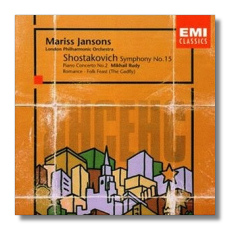
The Internet's Premier Classical Music Source
Related Links
- Shostakovich Reviews
- Latest Reviews
- More Reviews
-
By Composer
-
Collections
DVD & Blu-ray
Books
Concert Reviews
Articles/Interviews
Software
Audio
Search Amazon
Recommended Links
Site News
 CD Review
CD Review
Dmitri Shostakovich

- Symphony #15
- Piano Concerto #2
- Suite: The Gadfly
Mikhail Rudy, piano
London Philharmonic Orchestra/Mariss Jansons
EMI 56591
I find that there is something in Shostakovich that is almost too intense. His sound world is a chaotic kaleidoscope of feelings bouncing off one another like atomic reactions. In this way it is not unlike Martinů. Shostakovich, however, is much, much darker. In the 15th Symphony he approaches the twilight zone, laying in wait for you.
I read Steinberg's discussion of the symphony in his book of the same name. As usual it is a source of wonderful insights. He is particularly good at pointing out the self-references in this work. This added to my enjoyment immensely and I highly recommend his book to you.
The insert notes in this disc are at best a thumbnail sketch. In the discussion of the piano concerto they are terrible. There is not a word in them that provides any kind of biographical information about the composer. The producers of classical music recordings need to do a better job of educating the listeners. They need to assume that the average listener may have little or no musical education and are autodidactic. Naxos does a generally good job of this.
I will offer my own synopsis of the symphony, taken down over several days of listening. The first movement, as the composer suggested, is like a toy store at night. It is absurd. It is the childhood feelings we adults have largely forgotten, at least until you listen to this. There is parody, quotations of "The Lone Ranger" theme are used four times. There is boast, braggado, fun and fear. Then comes the bleak soundscape of the second movement. Here Shostakovich quotes from the tragic sorrow found in the first movement of his 11th Symphony. It is my opinion that the composer does this not just as a reference, but also as a means of looking at a previous work and realizing alternatives to the development. Shostakovich's music has always struck me as being more essentially existential than any other composer. That is, the poignancy and tragedy are carried from the individual to the suffering of an entire people. Welcome to the twilight zone for real. This is depressing, but in a haunting way that makes you want to experience it again and again. I found myself drawn to this particular recording over and over. To have lived through so much death and destruction wrought from without and within… this is the essence of this movement, this symphony. Then, as with Mahler, the absurd comes along in the third movement. It brings us back to the chaotic world of wonder in the first movement. Then we return to the field of ice. As he did so often in his last several symphonies, Shostakovich quotes from the bizarre march in his 7th Symphony. Slower here, but you can hear it. The final ticking is that of the clock absurdly going to its inevitable end. More than before, this symphony reminds me of Shostakovich's Quartets.
I compared this recording with the Melodiya recording with Rozhdestvensky conducting. One evening I listened to just the last movement four times one evening, once the Melodiya and trice this one. The EMI is darker, much darker. You really need to listen to this with headphones to capture the totality of the sound stage and effects sensed even when not heard. Jansons' timings are slower than Rozhdestvensky's, closer to the composer's son's recording on Collins, but there is no lack of tension. This is a masterpiece realized by Jansons.
One of the things I love about classical music is that there is so much to discover. Each time I return to a particular work, like the 15th, I gain new insights. Then there is the absolute new discovery. I had not heard the 2nd Piano Concerto prior to receiving this disc. The insert notes virtually dismiss it as second rate. Apparently the writer does not listen with the same ears. I loved it. It is a classical symphony in the outer movements, flanking a beautiful, romantic middle movement. It is not as dark as many of the composer's works, but it is wonderful Shostakovich.
The suite from the Gadfly is also Shostakovich Lite, but it is full of beautiful tunes. For some reason it brought to mind Charley Chaplin films.
This last batch of EMI discs I received for review have been a wonderful musical experience. More will be reviewed as time passes. I loved this disc and think you will, too.
Copyright © 1998, Robert Stumpf II


















